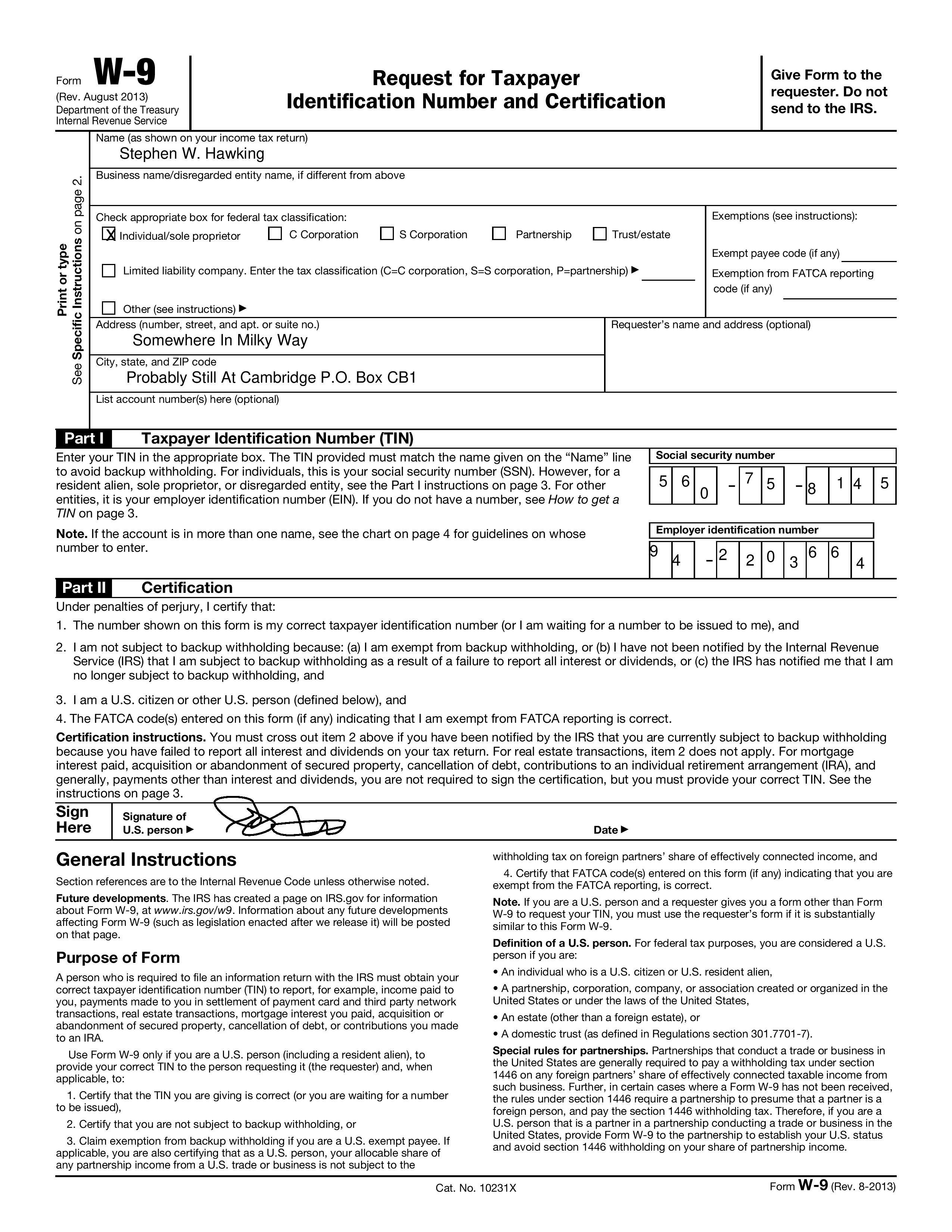US W9 OCR .NET
The .NET OCR SDK supports the W9 API.
Using the sample below, we are going to illustrate how to extract the data that we want using the OCR SDK.

Quick-Start
using Mindee;
using Mindee.Input;
using Mindee.Product.Us.W9;
string apiKey = "my-api-key";
string filePath = "/path/to/the/file.ext";
// Construct a new client
MindeeClient mindeeClient = new MindeeClient(apiKey);
// Load an input source as a path string
// Other input types can be used, as mentioned in the docs
var inputSource = new LocalInputSource(filePath);
// Call the API and parse the input
var response = await mindeeClient
.ParseAsync<W9V1>(inputSource);
// Print a summary of all the predictions
System.Console.WriteLine(response.Document.ToString());
Output (RST):
########
Document
########
:Mindee ID: d7c5b25f-e0d3-4491-af54-6183afa1aaab
:Filename: default_sample.jpg
Inference
#########
:Product: mindee/us_w9 v1.0
:Rotation applied: Yes
Prediction
==========
Page Predictions
================
Page 0
------
:Name: Stephen W Hawking
:SSN: 560758145
:Address: Somewhere In Milky Way
:City State Zip: Probably Still At Cambridge P O Box CB1
:Business Name:
:EIN: 942203664
:Tax Classification: individual
:Tax Classification Other Details:
:W9 Revision Date: august 2013
:Signature Position: Polygon with 4 points.
:Signature Date Position:
:Tax Classification LLC:
Field Types
Standard Fields
These fields are generic and used in several products.
BaseField
Each prediction object contains a set of fields that inherit from the generic BaseField class.
A typical BaseField object will have the following attributes:
- Confidence (
double?): the confidence score of the field prediction. - BoundingBox (
BoundingBox): contains exactly 4 relative vertices (points) coordinates of a right rectangle containing the field in the document. - Polygon (
Polygon): contains the relative vertices coordinates (PolygonextendsList<Point>) of a polygon containing the field in the image. - PageId (
int?): the ID of the page, alwaysnullwhen at document-level.
Note: A
Pointsimply refers to a List ofdouble.
Aside from the previous attributes, all basic fields have access to a custom ToString method that can be used to print their value as a string.
StringField
The text field StringField extends BaseField, but also implements:
- Value (
string): corresponds to the field value. - RawValue (
string): corresponds to the raw value as it appears on the document.
PositionField
The position field PositionField implements:
- BoundingBox (
BoundingBox): contains exactly 4 relative vertices (points) coordinates of a right rectangle containing the field in the document. - Polygon (
Polygon): contains the relative vertices coordinates (PolygonextendsList<Point>) of a polygon containing the field in the image. - Rectangle (
Polygon): a Polygon with four points that may be oriented (even beyond canvas). - Quadrangle (
Quadrangle): a free polygon made up of four points.
Page-Level Fields
Some fields are constrained to the page level, and so will not be retrievable at document level.
Attributes
The following fields are extracted for W9 V1:
Address
📄Address: The street address (number, street, and apt. or suite no.) of the applicant.
foreach (var AddressElem in result.Document.Inference.Prediction.Address)
{
System.Console.WriteLine(AddressElem)
.Value;
}
Business Name
📄BusinessName: The business name or disregarded entity name, if different from Name.
foreach (var BusinessNameElem in result.Document.Inference.Prediction.BusinessName)
{
System.Console.WriteLine(BusinessNameElem)
.Value;
}
City State Zip
📄CityStateZip: The city, state, and ZIP code of the applicant.
foreach (var CityStateZipElem in result.Document.Inference.Prediction.CityStateZip)
{
System.Console.WriteLine(CityStateZipElem)
.Value;
}
EIN
📄Ein: The employer identification number.
foreach (var EinElem in result.Document.Inference.Prediction.Ein)
{
System.Console.WriteLine(EinElem)
.Value;
}
Name
📄Name: Name as shown on the applicant's income tax return.
foreach (var NameElem in result.Document.Inference.Prediction.Name)
{
System.Console.WriteLine(NameElem)
.Value;
}
Signature Date Position
📄SignatureDatePosition: Position of the signature date on the document.
foreach (var SignatureDatePositionElem in result.Document.Inference.Prediction.SignatureDatePosition)
{
System.Console.WriteLine(SignatureDatePositionElem).Polygon;
}
Signature Position
📄SignaturePosition: Position of the signature on the document.
foreach (var SignaturePositionElem in result.Document.Inference.Prediction.SignaturePosition)
{
System.Console.WriteLine(SignaturePositionElem).Polygon;
}
SSN
📄Ssn: The applicant's social security number.
foreach (var SsnElem in result.Document.Inference.Prediction.Ssn)
{
System.Console.WriteLine(SsnElem)
.Value;
}
Tax Classification
📄TaxClassification: The federal tax classification, which can vary depending on the revision date.
foreach (var TaxClassificationElem in result.Document.Inference.Prediction.TaxClassification)
{
System.Console.WriteLine(TaxClassificationElem)
.Value;
}
Tax Classification LLC
📄TaxClassificationLlc: Depending on revision year, among S, C, P or D for Limited Liability Company Classification.
foreach (var TaxClassificationLlcElem in result.Document.Inference.Prediction.TaxClassificationLlc)
{
System.Console.WriteLine(TaxClassificationLlcElem)
.Value;
}
Tax Classification Other Details
📄TaxClassificationOtherDetails: Tax Classification Other Details.
foreach (var TaxClassificationOtherDetailsElem in result.Document.Inference.Prediction.TaxClassificationOtherDetails)
{
System.Console.WriteLine(TaxClassificationOtherDetailsElem)
.Value;
}
W9 Revision Date
📄W9RevisionDate: The Revision month and year of the W9 form.
foreach (var W9RevisionDateElem in result.Document.Inference.Prediction.W9RevisionDate)
{
System.Console.WriteLine(W9RevisionDateElem)
.Value;
}
Questions?
Updated 8 months ago
